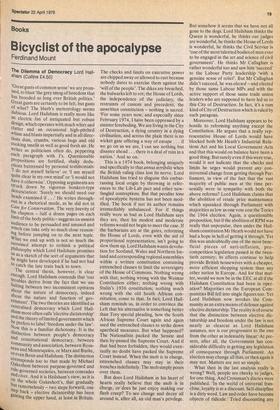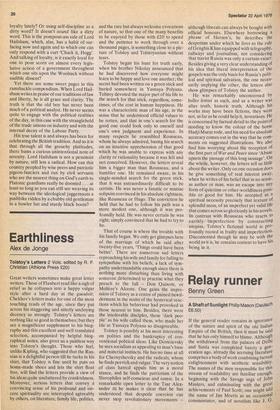BOO ks
Bicyclist of the apocalypse
Ferdinand Mount
The Dilemma of Democracy Lord Hailsham (Collins £4.50)
:Great gusts of common sense' we are promised, to blast 'the grey smog of boredom that has brooded so long over British politics.' Great gusts are certainly to be felt, but gusts of what? The blurb's meteorology seems dubious. Lord Hailsham is really more like
an electric fan of antiquated but robust design, which operates with much whirr and
clatter and an occasional high-pitched Whine and blasts impartially and in all directions dust, crumbs, various bugs and old
cooking smells as well as good fresh air. He writes as politicians often do, peppering each paragraph with I's. Questionable propositions are fortified, shaky deductions buttressed by personal testimonials: I do not myself believe' or 'I am myself quite clear in my own mind' or 'I would not have it otherwise'. Opposing arguments are struck down by vigorous bonkers-type denunciation: 'Surely we should need our heads examined if. . .' He writes throughout in a rhetorical mode, as he did not in Case for Conservatism. The very brevity of Ins chapters — half a dozen pages on each limb of the body politic — suggests an unseen audience to be persuaded and amused and Which can take only so much close reasonmg before jumping on to the next topic. What we end up with is not so much the sustained attempt to rethink a political Philosophy which Lord Hailsham promises us as a sketch of the sort of arguments that he might have developed if he had not had to catch the late train back to town.
The central thesis, however, is clear enough. Lord Hailsham contends that 'our troubles derive from the fact that we are halting between two inconsistent opinions about the nature of democracy, indeed about the nature and function of government'. The two theories are identified as centralised democracy which Lord Hailsham more often calls 'elective dictatorship' and the theory of limited government which he prefers to label 'freedom under the law'. No this is a familiar dichotomy. It is the distinction between people's democracy and constitutional democracy, between community and association, between Rousseau and Montesquieu, or Marx and Burke, or even Benn and Hailsham. The distinction corresponds too to that made by Michael Oakeshott between purpose-governed and rule-governed societies, between comrades and cives. And it is Hailsham's view, as it is on the whole Oakeshott's, that gradually but remorselessly — two steps forward, one Step back — elective dictatorship has been gaming the upper hand, at least in Britain.
The checks and limits on executive power are chipped away or allowed to rust because nobody dares to exercise them against the 'will of the people'. The dikes are breached, the bulwarks left to rot; the House of Lords, the independence of the judiciary, the restraints of custom and precedent, the unwritten constitution — nothing is sacred. 'For some years now, and especially since February 1974, I have been oppressed by a sinister foreboding. We are living in the City of Destruction, a dying country in a dying civilisation, and across the plain there is no wicket gate offering a way of escape . . . if we go on as we are, I can see nothing but disaster ahead. . . there is a deal of ruin in a nation.' And so on.
This is a 1974 book, belonging uniquely and specifically to that annus terribilis when the British ruling class lost its nerve. Lord Hailsham has tried to disguise this embarrassing local origin by throwing in references to the Lib-Lab pact and other newfangled contraptions. But that peculiar tone of apocalyptic hysteria has not been modified. The book if not its author remains irremediably unbalanced. For if things really were as bad as Lord Hailsham says they are, then his modest and moderate reforms would not begin to meet the case. If the barbarians are at the gates, reforming the House of Lords, even with the aid of proportional representation, isn't going to slow them up. Lord Hailsham wants devolution for Scotland, Wales and Northern Ireland and corresponding regional assemblies within a written constitution containing entrenched clauses to limit the sovereignty of the House of Commons. Nothing wrong with that; nothing wrong with the Weimar Constitution either; nothing wrong with Stalin's 1936 constitution; nothing much wrong with the old South African constitution, come to that. In fact, Lord Hailsham reminds us, in order to convince the Left that his alternative is something better than Tory special pleading, how the South African Supreme Court again and again
used the entrenched clauses to strike down apartheid measures. But what happened?
The Nationalists packed the Senate and then by-passed the Supreme Court. And if that had been forbidden, they would even tually no doubt have packed the Supreme Court instead. When the mob is in charge, entrenched clauses may stay in their trenches indefinitely. The mob simply pours over them.
But does Lord Hailsham in his heart of hearts really believe that the mob is in charge, or does he just enjoy making our flesh creep? To see change and decay all around is, after all, an old man's privilege.
But somehow it seems that we have not all gone to the dogs. Lord Hailsham thinks the
Queen is wonderful, he thinks our judges are wonderful, he thinks the House of Lords is wonderful, he thinks the Civil Service is 'one of the most talented bodies of men ever to be engaged in the art and science of civil government'. He thinks Mr Callaghan is rather wonderful too and saw him 'succeed' to the Labour Party leadership 'with a genuine sense of relief'. But Mr Callaghan
didn't succeed, he was elected —and elected
by those same Labour MPs and with the active support of those same trade union leaders who are supposed to have led us to this City of Destruction. In fact, it's a rum kind of City of Destruction which is ruled by such paragons.
Moreover, Lord Hailsham appears to be hostile to reforming anything except the Constitution. He argues that a really rep resentative House of Lords would have blocked both Mr Heath's Industrial Rela tions Act and his Local Government Acts and that this would on balance have been a good thing. But surely even if this were true,
would it not indicate that the checks and limits he urges would prevent any controversial change from getting through Parliament, in view of the fact that the vast majority of public men at the time personally were in sympathy with both the above reforms? Lord Hailsham claims that the abolition of resale price maintenance which squeaked through Parliament with majorities as low as one vote cost the Tories the 1964 election. Again, a questionable proposition, but if the abolition of RPM was really that unpopular, then under the Hailsham constitution Mr Heath would not have had a hope in hell of getting it through. Yet this was undoubtedly one of the most beneficial pieces of anti-inflation, procorn petition legislation passed in the twentieth century; its effects continue to help provide British housewives with a cheaper, more efficient shopping system than any other nation in Europe. And for that matter, would we now be in the EEC at all if the Hailsham Constitution had been in operation? Majorities on the European Communities Bill fell into single figures too. Yet Lord Hailsham now invokes the Community as an extra means of defence against elective dictatorship. The reality is of course that the distinction between elective dic
• tatorship and freedom under the law is not nearly as clearcut as Lord Hailsham assumes, nor is our progression to the one from the other as indeniably linear: At present, after all, the Government has considerable difficulty in getting any legislation of consequence through Parliament. An election may change all that, or then again it may not. Matters are not so simple.
What then in the last analysis re,ally is wrong? Well, people are cheeky to judges, for one thing. And Crossman's diaries were published. 'In the world of universal franchise, loyalty is at a discount. Self-discipline is a dirty word. Law and order have become objects of ridicule.' Tried discounting any
loyalty lately? Or using self-discipline as a dirty word? It doesn't sound like a dirty word. This is the pompous-ass side of Lord Hai!sham, which, alas, has a habit of surfacing now and again and to which one can only respond with a curt 'Chuck it, Hogg'. And talking of loyalty, is it exactly loyal for one to pour scorn on almost every legislative action of a government throughout which one sits upon the Woolsack without audible dissent?
Yet there are some sweet pages in this ramshackle compendium. When Lord Hailsham writes in praise of our traditions of law and liberty, he is all grace and clarity. The truth is that the old boy has never been much of a political analyst. He never seems quite to engage with the political realities of the day, in this case with the stranglehold of the trade unions on industry and with the internal decay of the Labour Party.
His true talent is and always has been for celebrating the British tradition. And so it is that through all the grouchy platitudes, there hums a curious unintentional note of serenity. Lord Hailsham is not a pessimist by nature, still less a radical. How can this country peopled by wise peers and patriotic pigeon-fanciers and run by civil servants who are the nearest thing on God's earth to Platonic guardians really be doomed. . . at least so long as you can still see weaving its way between the ideological juggernauts a pushbike ridden by a chubby old gentleman in a bowler hat and sturdy black boots?



































 Previous page
Previous page